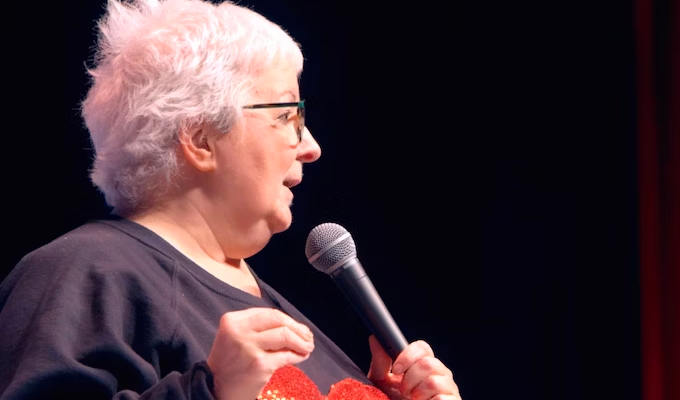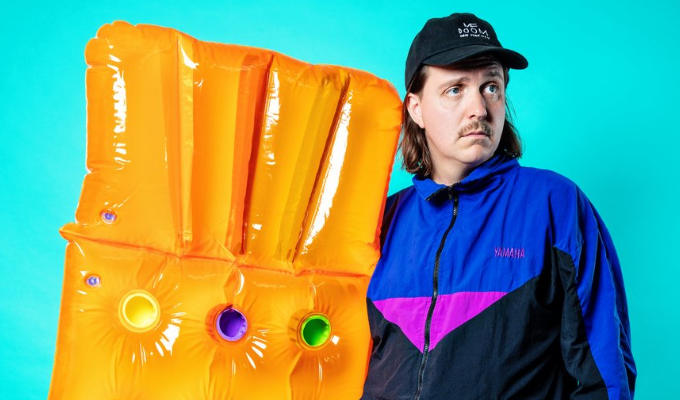
Janey
Review of the new documentary about stand-up Janey Godley
Most stand-up documentaries are either cosy retrospectives, shot when their subject has long since passed their peak and moved on to legendary status. Or fresh but nakedly commercial tie-ins for the release of a special.
But while Janey Godley’s stand-up shows have always, to an extent, reworked her autobiographical anecdotes over decades, John Archer's new film, following her on tour last year, elides any gap between past and present.
The comic's troubled 1960s and 1970s adolescence in the East End of Glasgow and her recent diagnosis of terminal ovarian cancer, the criticism and trolling over her historic offensive tweets and her becoming ever more professionally successful, have a blanket immediacy and timelessness.
As her daughter, support act and the catalyst for this film being made, Ashley Storrie, observes: 'She's always lived her life like she's running out of time.’
The ongoing double jeopardy of Godley's cancer and potential cancellation would undoubtedly support a film on its own. But her life has been characterised by resilience in the face of terrible circumstances, primarily the sexual abuse she suffered at the hands of her uncle as a child, her mother's murder and her marriage into a gangster family.
The film features brief footage of a 13-year-old Godley kicking a football across the street and her working in the pub in the Calton area of Glasgow that she and her husband owned in the 1980s, until his family's criminal activities forced them to flee.
It follows her as she revisits the River Clyde from where the body of her mother, Annie Currie, was recovered in 1982, and the childhood home where she and her sister were abused by their maternal uncle, David Percy.
We see her receiving cancer treatment, reflecting upon the changes it's made to her appearance and having a highly disturbing coughing fit mid-performance. Several seminal moments in her life are shared from the stage, with the practised but vivid recall of a born storyteller.
Archer can afford to take a hands-off approach, as virtually everywhere Godley is accompanied by her friend Shirley, an emotional support pal but also a proxy for the watching audience, conversationally opening her up.
And where Shirley isn't, Storrie tends to be, a filmmaker with a handheld camera backstage, keen to capture a performer in a golden period as she prepares for Glasgow's 3,000-seat SEC Armadillo venue, and a distressed daughter, facing up to losing her mother.
Sensitive and tender, Janey nevertheless captures some arresting friction, with Storrie questioning Godley's decision to remove her from her wider (problematic) family as an eight-year-old. And, most awkwardly, to leave her in the care of her mentally struggling, autistic father as mum threw herself bodily and soul into her burgeoning career as a stand-up.
Godley's certainly seldom held back. Several of her offensive tweets are displayed in what, with hindsight appears stark ugliness towards minorities. And the 'Trump Is A Cunt' placard with which she infamously greeted the former US President on a golfing jolly to Scotland is celebrated. She's shown putting together the comic voiceover videos that greatly boosted her popularity on the eve of Covid, a comic in their early 60s still evolving, embracing technology and cultivating new audiences.
Post-lockdown, there's a reunion with one of the stars of those videos, former Scottish First Minister Nicola Sturgeon, which, given the presence of others and cameras, is a relatively frank and unquestionably warm exchange between two women who've had their personal tribulations make front-page news.
Certainly, it's a more successful interaction than one that she has with Jimmy Carr about cancel culture, which features a slight crossing of wires as he gets atop his usual hobby-horse of not apologising for jokes deemed offensive, while she tries to discuss the fallout from tweets that she's already said sorry for.
More compelling you suspect, would have been a revisit of the life-changing conversation that Godley once had with Stewart Lee, which she remembers here, in which he urged her to ditch inconsequential jokes for her gritty stories about her family instead.
With a second autobiography, more tour dates, and another Radio 4 series on the way, Godley's fans aren't exactly starved of details of her rich, rollercoaster life. Yet Janey is still a worthwhile and intimate insight into an act whose fiercely devoted fanbase may already feel as if they know her inside out.
That being said, her husband, Sean, remains conspicuously absent from the story, beyond passing mention, which is curious, given the extent to which he's been a familiar part of her stand-up. There's no reference to her older brother, Mij, who died from a drug-related illness. And the film would likely benefit from her offering some deeper self-analysis of the offending tweets, outwith them simply being wrong, allowing for some historical context of the social media and comedy culture that once made them more-or-less acceptable.
Otherwise, though, Archer's access is exceptional. And what Janey loses in journalistic rigour through respect for its subject – a redoubtable force of nature who will never go gently – it gains from affording her and Storrie the final words, a lesson in how to self-dramatise a remarkable life.
• Janey was screened at the Glasgow Film Festival tonight, and is being shown around Scotland from later this week, some with Godley appearing in person. Janey screenings.
Review date: 10 Mar 2024
Reviewed by: Jay Richardson









